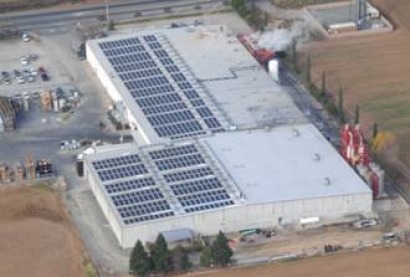
FAFCO and BCM Construction have completed installation and commissioning of the system at Stapleton-Spence Packing Company in Gridley, Calif. The system is expected to save approximately $20,000 annually in reduced natural gas water heating cost – helping provide a payback for the pre-heating system in approximately three and one-half years after Federal incentives plus a $476,000 rebate from the California Solar Initiative (CSI) for the food processing facility.
Stapleton’s uses large amounts of hot water every day in its fruit processing operations in Northern California. Prior to installing the FAFCO solar water pre-heating system, water from a well was sent straight to a boiler where it was heated for use in processing. The FAFCO solar water system now pre-heats the water by approximately 30 degrees as it comes from the well, before sending it to the boiler, thereby reducing the load and energy required to create hot water and steam.
The system utilizes 20,000 square feet of FAFCO all-polymer solar collectors, a 13,000-gallon storage tank, a unique control and fluid circulation system, and all-polymer piping to pre-heat well water before entering the two existing 600 hp boilers.
Stapleton’s produces juice, fruit purees, and nuts, and is known as the largest packer of private label canned prunes in the food service industry. The plant consumes an average 650,000 therms of natural gas per year, primarily used to create steam to rehydrate dried fruit. The savings, which will vary with weather, water temperature, and hot water consumption, are estimated to be 37,584 therms per year by the California Solar Initiative (CSI) incentive calculator. This is the equivalent of approximately 1,000,000 kWh or a carbon footprint offset of 1.4 million pounds of CO2.
FAFCO’s solar hot water system can easily integrate into both new buildings and existing facilities. The lightweight, efficient solar collectors can often be installed without roof reinforcement and with minimum operational disruption.
Using a proprietary co-polymer blend, FAFCO collectors withstand even the harshest outdoor environments and absorb heat from the sun at very high efficiencies. While unglazed polymer collectors reach and sustain the temperatures necessary to efficiently heat water, they are immune to overheating – the number one problem plaguing alternative solar water heating technologies, including glazed and evacuated tube systems.
By focusing on pre-heating incoming mains water, companies can significantly reduce the energy used by their boilers. Fruit and vegetable processors, poultry processors, dairies, breweries, commercial laundries, restaurants, cafeterias, and dormitories are just a few of the most likely beneficiaries of installing solar thermal systems to lower water heating expense.
The CSI rate payer-funded state program has approximately $280 million budgeted for solar water heating installations. When the federal 30% tax credit is applied on top of the state program, companies can often reach 3- to 6-year paybacks for installations of solar thermal systems in California.
“Harnessing heat from the sun to cut the amount of conventional energy required to heat water delivers long-term financial rewards – monthly energy savings, reduced operating expenses and protection against rising energy prices. It also yields significant sustainability dividends by contributing to a cleaner environment,” said FAFCO on a recent press statement.
For additional information:

